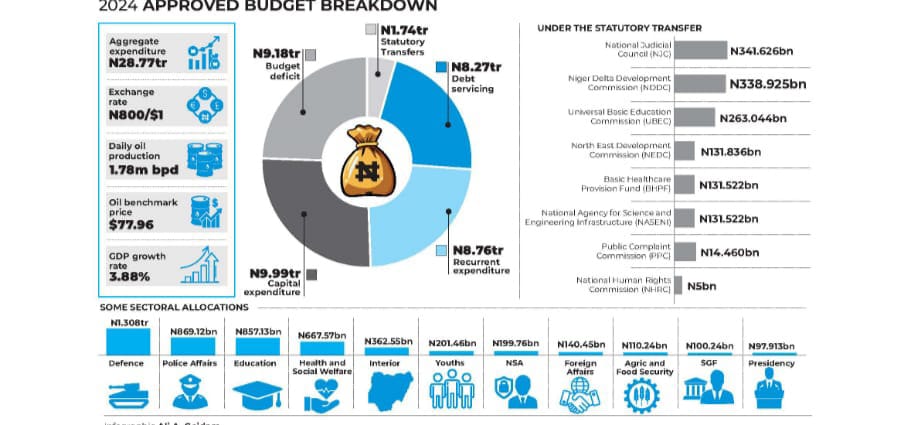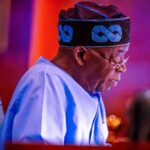Experts yesterday set the economic agenda for the federal government following the signing of the 2024 budget by President Bola Ahmed Tinubu.
This is even as ordinary Nigerians, who spoke to Daily Trust, demanded quick relief from the economic woes.
Tinubu signed the N28.78trn budget after returning to Abuja from Lagos where he spent the Christmas and New Year’s holidays.
Ancient Kingdom of Udi gets new traditional ruler
Ritual killings, most disturbing trend in Ogun – CP
How to get economy working – LCCI, NECA
The Lagos Chamber of Commerce and Industry (LCCI) called on Tinubu to bring private sector investment into the transmission segment of the power sector in a bid to ensure adequate technical and financial capacity for a well-functioning sector to power economic growth.
Director-General, LCCI, Chinyere Almona, in a statement, said: “There’s an urgent need to address the structure of the power sector.”
She cautioned that investment in agriculture could fail if the government fails to deal with insecurity.
She asked the government to fast-track the movement of the police from the Exclusive List to the Concurrent List as part of measures to guarantee effective policing.
“The LCCI believes that while removing the fuel subsidy was necessary, its impact on individuals, families, and businesses, leading to discomfort, must be carefully managed. The potential ripple effects on the cost of living and inflation must be closely monitored. Acknowledging the challenges of high inflation (above 28%) and an unacceptable under-employment rate is crucial. However, specific strategies to address these issues were not mentioned, leaving room for concerns about the impact on citizens,” she said.
She urged the government to provide more detailed plans and strategies to tackle inflation, under-employment, security and social inequality.
On his part, the Director-General of the Nigeria Employers’ Consultative Association (NECA), Adewale-Smart Oyerinde, advocated fiscal discipline.
He also said multiplicity of taxes paid by manufacturers must be addressed.
He said some government policies in the past had stifled the private sector from operating maximally and contributing to the growth of the economy.
He called for a review of the legislative and regulatory framework affecting the growth of the economy.
“I must say that we witnessed a high level of engagement of the private sector in recent weeks. We have a private sector representative in customs as well as in the fiscal and monetary policies committee. We’re hoping more private sector representatives could be involved in more critical sectors so they can make meaningful contributions to addressing these challenges,” he said.
Professor Adeola Adenikinju of the Department of Economics, University of Ibadan and Vice-President of the Nigerian Economic Society urged the government to shore up oil revenue by blocking leakages and addressing oil theft to boost production and improve the economy.
He also asked the government to achieve ample domestic production by ensuring the refineries work for domestic consumption.
He listed other areas the government must focus on including electricity, food security and sufficiency and tackling inflation, adding that solving insecurity would boost food security and reduce spending on food importation.
“The other area the government needs to focus on is agriculture and food production,” he stated.
An economist and senior partner at SPM Professionals, Paul Alaje, said the federal and state governments must remove barriers to investments in 2024.
He said it was high time governors started seeing themselves as number one marketers of their states, “Investment drive cannot be left to the federal government alone, the sub-nationals have been docile and it’s time to wake up.”
A capital market holding company, Afrinvest, in its 2024 outlook, said economic outcomes would depend on how the current administration can carry through with the ongoing reforms, improve the business environment to end the recent spate of closure by mid and large-sized business entities, improve national security, enhance internal shock absorbers to external risks, and narrow structural gaps.
PDP demands account of earnings
The Peoples Democratic Party (PDP) described the president’s New Year speech as a “Harvest of deceit, false claims and empty promises.”
It said the speech was “Unpresidential, uninspiring and amounts to a waste of valuable time as it did not address any of the critical issues plaguing the nation.”
The party, in a statement by its National Publicity Secretary, Debo Ologunagba, said: “What Nigerians demand of President Tinubu is to provide a comprehensive account of our nation’s earnings including the proceeds from the removal of subsidy on petroleum products, especially in the face of allegations that the earnings are being diverted to private pockets of APC leaders and their cronies.”
It challenged the National Assembly to hold the executive accountable “As the custodian of the purse of the nation.”
The PDP said Tinubu failed to address the vexatious issue of incompetence, insensitivity, massive profligacy, and unbridled treasury-looting inherent in his administration, which have put our nation in dire straits.
“More distressing is that President Tinubu had no words in his New Year address for the Christmas Eve genocidal massacre of over 200 Nigerians by terrorists in Plateau State and the murder of over 5,000 citizens in Plateau and other states of the federation under his watch since May 29, 2023. What manner of a president!”
Tinubu’s New Year speech display of arrogance, disregard for Nigerians – LP
The Labour Party (LP) alleged that it was shocked by the hollowness of the New Year’s speech by Tinubu.
Its national publicity secretary, Obiora Ifoh, in a statement, alleged that the speech conveyed to Nigerians a high level of hypocrisy, deceit and lack of empathy.
“It’s depressing to note that the president and his handlers didn’t deem it fit to include a word of comfort for the families of over 200 persons killed by terrorists during the Christmas Eve massacre in Plateau State. What a shame!
“The president’s helplessness in the face of his glaring failure to address the critical issues of insecurity, decayed infrastructure, the collapse of the manufacturing and productive sectors, inflation and the Naira to Dollar exchange rate, which is spiralling out of control is written all over the speech,” he stated.
He also said Tinubu’s speech had no word about the alleged massive looting of the nation’s resources by appointees and party leaders in various sectors.
After signing the budget yesterday, Tinubu said the implementation of the budget would be efficiently pursued and vigorously monitored, adding: “All the institutional mechanisms shall be held to account in ensuring diligent implementation.
“All MDA’s have been directed to take responsibility and provide monthly Budget Performance Reports to the Ministry of Budget and Economic Planning, which in turn shall ensure the veracity of such. The Minister of Finance and Co-ordinating Minister of the Economy shall hold regular reviews with the Economic Management Team and, in addition, I shall chair periodic Economic Coordination Council meetings,” he said.
The top priorities of the 2024 budget of N28.7 trillion are defence and internal security, job creation, macro-economic stability, improved investment environment, human capital development, poverty reduction and social security.
The president reiterated his commitment to enhancing investment promotion while creating a rules-based society that favours no individual over the law.
This, according to him, begins with important reforms in the Nigerian judiciary, the funding for which is captured in the 2024 Appropriation Act.
“Funding the judiciary is a major element in our effort to support a just, rules-based society. Statutory transfer to the Judiciary has been increased from N165bn to N342bn,” the president said.
Some of the key estimates are capital expenditure, N10trn; recurrent, N8.8trn; debt service, N8.2trn and statutory transfers, N1.7trn.
The Senate had on Saturday afternoon passed the N28, 777,404,073,861 budget, which it increased by about N1.2tn.
The president had presented N27.5tn to the joint chambers of the National Assembly on November 29, 2023.
The Senate had also increased the exchange rate from N750 to N800 per dollar while the 1.78mbpd daily oil production, US$77.96 oil benchmark price and GDP growth rate of 3.88% were approved as proposed by the executive arm of government.
Tinubu noted that the approved 2024 budget contained a very good increase in the capital side, a reduction in recurrent expenditure and brought down the deficit from 6.11% to 3.88%, describing it as an achievement.
He said: “We can debate in the area of economic thinking, whether capital expenditure and reduction in the current means what. It is subject of interpretation. It means a lot. It means where hope is hanged in development and particularly human capital development. When you pay attention to education, health and road infrastructure you are resuscitating the economy and making sure that the ordinary people are carried along.
“Let me take one of them. While we take power and steel and other projects, one of the priority areas we just passed is the N100bn provision for the feeding of school children that’s a stimulant that’ll encourage our school attendance and others,” he said.
Senate President Godswill Akpabio told State House reporters that the budget moved from N27trn to about N28trn with “verifiable justifications”.
Speaker, House of Representatives, Tajudeen Abbas, said the president also signed the supplementary appropriation bill of 2023, extending its implementation by 90 days.
He said the supplementary budget would continue to work concurrently with the 2024 budget up to March 31.
The Minister of Finance, Wale Edun, said the change in this budget was its focus on growing the economy.
He said the budget implementation would be based on planning, especially on critical issues and financial shortfalls.
“So, we’re relying less on borrowing and more on revenue and I think you have to take the two together. I think we’re very optimistic about the improvements in revenue that will take place.”
Edun said the government was bringing order to government borrowing, saying “Ways and Means is being eliminated by taking the funding that is required from the market, as opposed to from printing of money by the Central Bank.”
Nigerians speak
A trader in Kano, Suleiman Abdullahi said the federal government should address inflation which has wiped out their capital.
“Life is very difficult for us now because the market is unpredictable. You are not sure of buying goods at the same price you bought them last week. This is seriously eroding our little profit margin and our capital,” he said.
Muhammadu Hussaini, a farmer in Katsina urged the government at national and subnational levels to prioritise security.
“The budget will not succeed unless there is security in the land. This should be the priority of the president, governors, and local government chairmen, traditional and religious leaders.
“I heard the president saying they will support Nigerians to cultivate 500,000 hectares of land. This is possible provided they will address issues of insecurity,” he said.
A middle-aged man and resident of Oke Aro in Ogun State, Mr Aiye Adebayo Cyril, said the government hardly implements budgets.
He urged the government to make provision for the less privileged and SMEs and address unemployment.
Miss Omotoshola Sarimakin, a resident of Ojodu, Lagos, said, “My expectation from the president is more of action and less of talks. He should also reduce unnecessary travelling. A whole lot of allocations were done, I expect the funds allocated to be used for necessary projects.”

 Join Daily Trust WhatsApp Community For Quick Access To News and Happenings Around You.
Join Daily Trust WhatsApp Community For Quick Access To News and Happenings Around You.


